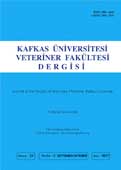
This journal is licensed under a Creative Commons Attribution-NonCommercial 4.0 International License
Kafkas Üniversitesi Veteriner Fakültesi Dergisi
2017 , Vol 23 , Issue 5
Effect of Laurocerasus officinalis Roem. (Cherry Laurel) Fruit on Dimethoate Induced Hepatotoxicity in Rats
1Department of Pharmaceutical Toxicology, Faculty of Pharmacy, Erciyes University, TR-38039 Melikgazi, Kayseri -TURKEY2Department of Pharmaceutical Botany, Faculty of Pharmacy, Erciyes University, TR-38039 Melikgazi, Kayseri - TURKEY
3Department of Basic Sciences, Faculty of Medicine, Erciyes University, Kayseri, TR-38039 Melikgazi, Kayseri - TURKEY DOI : 10.9775/kvfd.2017.17748 Dimethoate is one of the most important organophosphate insecticides and may cause oxidative stress leading to production of free radicals and alterations in antioxidants. The aim of this study was to investigate the protective effects of Laurocerasus officinalis Roem. fruit extract containing antioxidant compounds on dimethoate-induced hepatotoxicity in rats. The rats were divided into six groups as follows: Control group; dimethoate-treated group; L. officinalis-treated group; the group of pre-treatment with L. officinalis prior to dimethoate; the group of pre-treatment with vitamin C before dimethoate; the group of post-treatment with L. officinalis after dimethoate. Aspartate transaminase (AST), alanine transaminase (ALT), and total bilirubin (TBil) as liver function tests and the oxidative stress parameters such as total oxidant status (TOS), total antioxidant status (TAS), superoxide dismutase (SOD), catalase (CAT), glutathione peroxidase (GPx), and malondialdehyde (MDA) were measured. The DNA damage was determined with comet assay. The results indicated that dimethoate caused a significant increase in AST, ALT, TOS, MDA, DNA damage and an important decrease in TAS, SOD, CAT, GPx as compared to control group. However, administration of L. officinalis or vitamin C to dimethoate-exposed rats restored these biochemical and oxidative stress parameters to nearly normal levels. In conclusion, toxic effects of dimethoate on rat liver are mainly attributed to hepatic function enzymes, oxidative stress and DNA damage, while these effects were largely ameliorated by L. officinalis fruit extract. Keywords : Laurocerasus officinalis Roem, Cherry Laurel, Dimethoate, Hepatotoxicity, Rat










